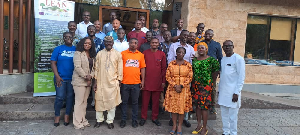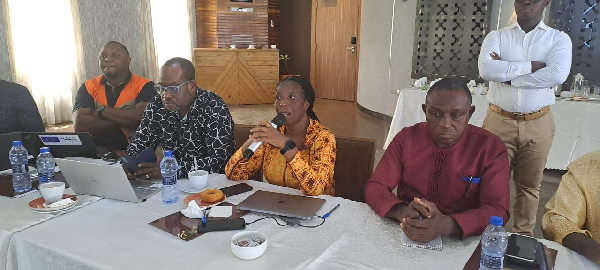 The team that undertook the LEAN project
The team that undertook the LEAN project
The Landscapes and Environmental Agility across the Nation (LEAN) project, funded by the European Union (EU), which began in 2020, aiming to address critical barriers in Ghana's Savannah, High Forest, and Transitional Ecological Zones has reached the final lap.
The four-year project implemented by Rainforest Alliance in the High Forest zone, World Vision Ghana in the Savannah landscape, and EcoCare Ghana and Tropenbos Ghana in the Transition zone recently held the 5th Steering Committee Meeting at Peduase Valley Resort Hotel, Aburi.
The objective of the meeting was to update the steering committee on the project's overall progress and planned activities for the final year as the project ends.
According to the Country Director of Rainforest Alliance, Mr. Nicholas Jengre who joined the project in its third year in his welcome Address thanked the members of the committee for the wonderful job done in guiding and shaping the processes of the project.
Mr. Jengre noted that the bigger threat to the whole world is climate change and the EU LEAN project is geared towards fighting it. He also urged the members to be very objective because if one part fails, everyone fails.
Speaking to the media, Mr Mohammed Assah the former chairman of the steering committee expressed excitement about being part of the project.
According to him, Ghana has always been struggling on how to keep the environment particularly the savanna middle belt and then the forest area intact and that has led to the loss of forests over the years thus EU LEAN as a project despite some challenges that it has, has made so much input into the achievement of reducing the degradation of the environment.
He said “One thing about the project that I think it’s achieved is the institutional collaboration, how the various institutions are committed to this consortium, and not even the consortium level but the other institutions for instance I came from the academia and it is not always easy to work with academia, but EU LEAN has been able to let me understand that we have a common interest and we're all to achieve it. The same way for other institutions like the cocoa board, the Forestry Commission, and the rest. You can see all their commitment. I think it is the way the project has been designed, and how it's being managed that has brought about all these results. So by and large, EU LEAN is successful to a large extent, but the full length will be realized after the project is completed.”
At the project’s steering committee which was instituted to support the Project Management Team in identifying opportunities to improve project efficiency, effectiveness and impact, the Project Managers of the various landscapes detailed the key thematic areas of the project being the governance structures with regards environmental protection and awareness, forest protection and climate resilience, livelihood improvement or income, livelihood diversification and the sustainability and scalability as well as the progress made towards achieving the ultimate goal through this areas.
“We have over the last 4 years worked with our partners to implement project activities which have positively impacted our landscape. The project is on track to achieving its goal of contributing to the national effort of reducing emissions, conserving biodiversity and improving farmer livelihoods in the landscape before exit” One partner said.
The team added that they have not yet concluded the project and though they may have made some progress in the different areas where they work, there were still some gray areas that they needs mopping up and that is what they are currently focusing their energy on.
